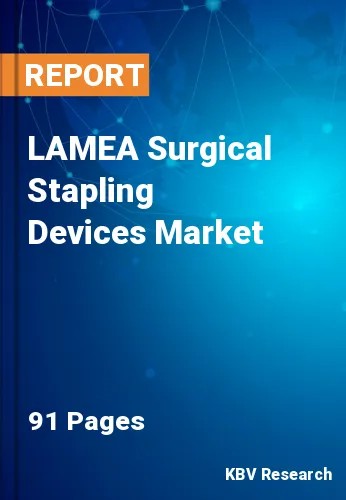The Latin America, Middle East and Africa Surgical Stapling Devices Market would witness market growth of 11.6% CAGR during the forecast period (2022-2028).
Surgical staplers compress tissue, join two sections of tissue with staggered rows of B-shaped surgical staples, and, in specific models, even remove the extra tissue. Surgery designs come in various shapes, most of which may be either linear or round. Using the grips at one end of a linear stapler, the surgeon shuts the "jaws" of the stapler at the other end over the tissue. As the surgeon pushes the trigger on the stapler, a blade cuts the tissue between the staples while a row of staples binds the tissue together.
By occluding the open wound, the treatment stops the bleeding. In minimally invasive operations, linear staplers connect tissues or remove organs. Circular staplers are frequently used in procedures affecting the digestive tract, from the neck to the colon. Circular staplers discharge two rows of staples alternately from a circular cartridge.
After removing a segment, the stapler may unite two segments of the intestine or another tube-like structure using this circular configuration. Between the staples, the tissue puckers up to form rings or donuts. A built-in blade removes the excess tissue, securing the new bond. The surgeon examines the closed incision for around 30 seconds to confirm that the tissue has been suitably squeezed and there is no bleeding.
In Israel, the proportion of overweight and obese adults and children has increased. According to the 2008 KAP study, 13.7% of adults over 18 are obese, and 34% are overweight. A discrepancy between the number of calories ingested and the amount of energy lost via physical activity leads to weight gain and, eventually, obesity. Excess calories are typically ingested due to high-calorie fast food, growing portion sizes, and the low price of high-calorie meals. Meanwhile, physical activity has declined due to increasing time spent watching T.V, using computers, and interacting with other electronic gadgets. The higher cases of obesity will raise the demand for numerous surgeries like bariatric surgery, thereby surge the need for surgical stapling devices driving the market growth in LAMEA.
The Brazil market dominated the LAMEA Surgical Stapling Devices Market by Country in 2021, and would continue to be a dominant market till 2028; thereby, achieving a market value of $127.6 Million by 2028. The Argentina market is experiencing a CAGR of 12.2% during (2022 - 2028). Additionally, The UAE market would display a CAGR of 11.3% during (2022 - 2028).
Based on Type, the market is segmented into Reusable and Disposable. Based on Product Type, the market is segmented into Manual and Powered. Based on End-use, the market is segmented into Hospitals and Ambulatory Surgical Centers. Based on countries, the market is segmented into Brazil, Argentina, UAE, Saudi Arabia, South Africa, Nigeria, and Rest of LAMEA.
Free Valuable Insights: The Worldwide Surgical Stapling Devices Market is Projected to reach USD 7.9 Billion by 2028, at a CAGR of 9.4%
The market research report covers the analysis of key stake holders of the market. Key companies profiled in the report include Stryker Corporation, Medtronic PLC, BioPro, Inc., ConMed Corporation, Smith & Nephew PLC, Intuitive Surgical, Inc., Johnson & Johnson (Ethicon, Inc.), B. Braun Melsungen AG, Becton, Dickinson and Company and Meril Life Science Private Limited.
By Type
By Product Type
By End-use
By Country
Our team of dedicated experts can provide you with attractive expansion opportunities for your business.

